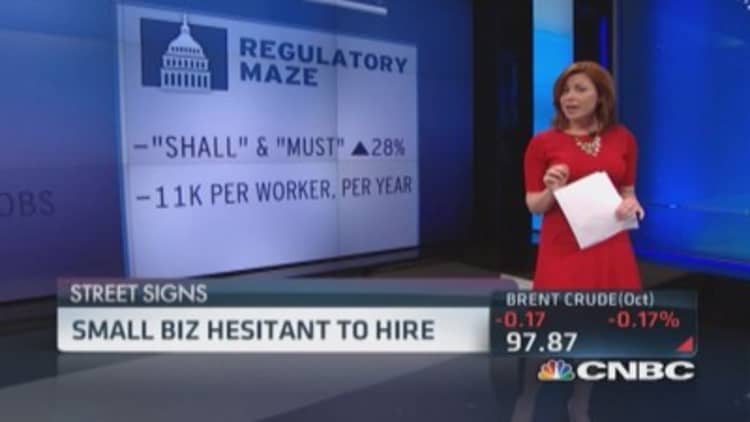Few small businesses think now is the time to expand, and hiring was essentially flat for the 11th straight month in August, according to the latest release of the small-business optimism index from the National Federation of Independent Business. And even weaker job creation may lie ahead.
But wait. There may be a silver lining.
Despite the uneven recovery following the 2008 financial crisis, resilient Americans still trust small businesses to guide the economy forward. That's according to a survey conducted for CNBC and Burson-Marsteller by market research firm Penn Schoen Berland. The study canvassed some 25,000 people and 1,800 corporate executives in 25 countries about the role of corporations in the economy and broader society.
While Americans tend to trust small businesses to guide the economy, for example, Chinese survey respondents said they tended to trust corporations more.
Read MoreSome shrug at 'Made in USA'—but that could change
Experts in entrepreneurship aren't surprised by Americans' particularly strong feelings about small business. So why does it persist? Part of the answer may lie in Americans' DNA.
Collectively, Americans value entrepreneurs, who (ideally) strike out on their own from humble beginnings and achieve wild success. Tech millionaires and billionaires who never went to college, including Bill Gates, enjoy rock star status.
"The media celebrates entrepreneur heroes," said Donna Kelley, entrepreneurship professor at Babson College. "Everyone can identify a famous entrepreneur, even if they can't identify a famous athlete or scientist."
And U.S. history broadly is a story of immigrants, who don't wait for the government or institutions to script their lives. Immigrants take huge leaps of faith and succeed wildly—or at least fail fantastically, then quickly lick their wounds and engineer their next start-up idea. Silicon Valley is littered with such tales.
"It seems part of the American dream that you can make yourself out of nothing," said Jason Wiens, policy director at the Kauffman Foundation, a private group focused on entrepreneurship. "It's part of our national culture," he said.

Respondents in the U.S., according to the survey, said small businesses have the "most responsibility" for economic growth—26 percent. Americans rated the importance of small business higher than respondents from either developed or developing nations, including Germany, China, Japan and Singapore, all of which ranked small business in single percentage points.
Read MoreMore businesses exporting 'Made in USA' again
Spain came in second in terms of its attitudes toward the importance of small businesses, with 24 percent of respondents saying small businesses are the most responsible for generating economic growth.
Beyond cultural attitudes, factors such as social welfare programs, unemployment benefits and the size of governments can influence views on entrepreneurship, said Kelley of Babson College. A large social safety net and presumed job security can deter entrepreneurship. The opposite scenario can also apply.
"If I have to face a lot of government-imposed restrictions on a business I'm starting, including being unable to fire or lay off employees, there is less incentive to venture into entrepreneurship," she said.
More American entrepreneurs are launching businesses based on perceived opportunities and a broad optimistic outlook—a group sometimes called opportunity entrepreneurs. Opportunity perceptions among Americans reached 47.2 percent in 2013—a record, according to the 15th annual Global Entrepreneurship Monitor (GEM) report released earlier this year.
American small businesses have historically created two-thirds of new private jobs in the U.S. economy. But the small-business sector has struggled to recover in recent years. Part of the solution may lie in supporting networks of start-ups in U.S. cities.
Kauffman recently studied the start-up community in St. Louis and found that the "density" of connections among entrepreneurs played an important role in the success of local small businesses. Start-ups and potential investors had been having a hard time connecting with one another, compared with other regions, such as New York City or the Silicon Valley.
"Entrepreneurs did not know other entrepreneurs or any support existed in St. Louis," said Yasuyuki Motoyama, the primary researcher behind Kauffman's entrepreneurial paper.





